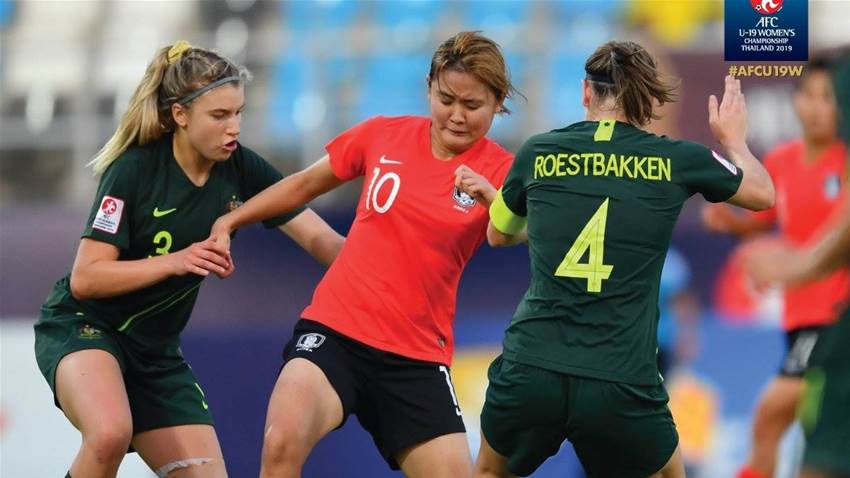The Young Matildas lost 9-1 to the South Koreans. What a gut-wrenching way to bow out of the AFC U/19 Championships and another youth World Cup.
1. WE'RE ON A VERY SLIPPERY SLOPE
We have a world-class national team ranked above any other nation in this competition, the best domestic league in this competition by some margin and a brilliant record of producing elite young players.
So why on earth did we concede 21 goals in three matches against our closest opponents?
If we can't compete with these teams at youth level, but we can compete with them at senior, it can't be because our players aren't good enough. It has to be the way our teams are organised.
One of the major disadvantages we seem to have is the decentralisation of our youth programs. The standard practice in world football is to place the responsibility for developing young players with their clubs.
It's a system that should make sense for us, given the quality of players we attract to the W-League. Surely it's better to have Courtney Nevin training alongside Lynn Williams this year than plying her trade in the Australian Institute of Sport?
But we've seen time and time again, whether it's against North Korea or Bangladesh, that youth teams that are centralised and subject to strict training regimes and camps together become very competitive against us.
But unfortunately, the answer isn't as easy as shipping them all off to Canberra.
Japan have won every AFC U/19 Championship since 2009 and their players don't play in a centralised system. Neither do the South Koreans.
Instead, they follow the same system as us. Their youth players each play for individual clubs, most of whom are linked to men's clubs just like ours. There are several other key factors inherent in this: population, monetary resources, the popularity of the sport.
But once again, when you look at our national team's success, these are all distractions from the real problem.
Ultimately, it has to come down to the quality of the coaching.
At senior level, the Matildas have elite coaches and facilities. They ply their trade in foreign competitions under elite coaches as well. That enables them to compete with the world's best.
Unfortunately, our Young Matildas don't have that. Until we do, we face a very significant risk of declining in Asia and the world the same way our men's team has.
That decline has had a real impact on the popularity of Australian men's football. Given how far we've come to reach the point where women's football is a mainstream sport in Australia, a similar fate would be very devastating indeed.
2. IT DIDN'T HAVE TO END THIS WAY
The individual quality of our players and our broader philosophy as a sporting nation all demands that while we may lose, we lose in a fashion that befits our competitive ethos.
We didn't have to drop our heads and try to defend a narrow lead against the North Koreans, one of the major factors in our ultimate 5-1 loss. Similarly, we didn't have to field a second-string lineup and play an impractically defensive, long-ball system against the Japanese, resulting in a 7-0 loss.
We can't expect a group of young women to survive two demolitions at the hands of similarly skilled opponents and then enter a do-or-die playoff with confidence.
Even if a largely understrength side had have been smashed by the Japanese playing attacking, high-pressing football, it would have been better for our confidence in the long-term.
It would have shown our best and brightest that while sometimes you play your best and you lose, you always play your best regardless. There's something uniting, even inspiring about having the confidence to play a better side without fear, even if that fear is justified.
It's certainly better from a developmental perspective, if nothing else.
This isn't to say there's anything wrong with defensive, counter-attacking football if it's done correctly.
But you can't play an offensive possession game on Tuesday and then a bus-parking, hit-and-hope style on Friday if you're only together under a new coach for a few weeks a year. It's impossible.
If this tournament teaches us one thing, it should be that we have absolutely nothing to gain from trying to minimise the damage and play cynical tactics in the hope of scraping our way into a youth World Cup.
Not only doesn't it work, what's the point? How does it make us better to get to the U/20 World Cup and then get smashed when we get there?
If we're going to lose in these tournaments, we can bloody-well do so on our own terms.
3. THE POSITIVES AND THE NEGATIVES
We've laboured these points across two tournaments now, so rather than bang-on about our tactics any longer, we thought we'd instead focus on a few key positives to take out of the AFC Championships.
Throughout this tournament we've witnessed this young team in a very difficult environment. They've had to play in unplayable conditions with everything on the line (and won). They've had to keep our heads up despite enduring humilating scorelines.
They've had to throw their bodies on the line to make last-ditch challenges, when the game is already decided. They've had to play different positions and tactical formations in games merely a few days apart from each other.
Our individual quality is also a real highlight. We've spoken about certain players throughout this tournament who have stood out, but woman-to-woman we can tell that our players are - and will become - very competitive on the world stage as they continue to develop.
We can takeaway from a very difficult tournament some cracking highlights. The quality of the few goals we've scored has been unbelievable. The tackling and bursting runs likewise. Some of the saves and blocks, even tonight, were top-class as well.
When we're playing with confidence, it's like a wave goes through this team and suddenly every player on that park is an inch taller and a second faster. Just remember that feeling.
More than anything, these women have had to handle multitudes of pressure at a very young age. Hopefully they can all form a sense of comradery from this.
Being young is all about learning. At least we can guarantee this is something that they'll learn from.
Related Articles

Ex Man United star Varane signs for Italian club Como

Champion A-League coach set to join Premier League giants














